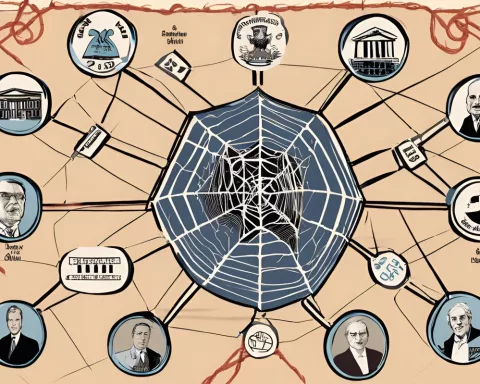The CIGFARO 2024 conference was a vital event focused on improving public finance in South Africa. Key leaders gathered to discuss important topics like ethical leadership and local government performance, emphasizing the need for good management of public money. With a strong commitment to accountability and fighting corruption, the conference aimed to strengthen local governments so they can better serve citizens. This gathering ignited hope for a brighter future, where effective public finance leads to improved lives for everyone in the community.
What is the significance of the CIGFARO 2024 conference in public finance?
The CIGFARO 2024 conference is crucial for advancing public finance excellence in South Africa. It emphasizes ethical leadership, local government professionalization, and accountability. Key discussions focus on enhancing fiscal management to improve service delivery, ensuring that public resources are used effectively for citizens’ benefit.
A Milestone Gathering in Public Finance
The Chartered Institute of Government Finance Audit and Risk Officers (CIGFARO) 2024 conference emerged as a pivotal event, capturing the attention of influential leaders and stakeholders within the public finance sector. This esteemed gathering celebrated 95 years of dedicated service to public finance excellence, marking a significant milestone. Against this backdrop, Dr. Namane Dickson Masemola, Deputy Minister of Cooperative Governance and Traditional Affairs (COGTA), delivered an impactful keynote address that resonated with historical depth and future potential.
The conference’s central theme, “Accelerating Public Finance Excellence,” stressed the urgency of advancing fiscal management as a foundational aspect of effective governance. Dr. Masemola’s address drew inspiration from iconic figures like Ernesto Che Guevara and Nelson Mandela. He highlighted the ethical imperatives that drive public service, echoing Guevara’s belief in love as the core of true revolutionary action and Mandela’s view that a nation’s character is revealed in its treatment of the less privileged. These reflections illuminated the moral foundation underpinning public finance management in South Africa.
Moreover, Dr. Masemola emphasized that public finance transcends mere fiscal oversight. It serves as a vital mechanism through which the government fulfills its constitutional obligations to citizens, ensuring the provision of essential services such as water, sanitation, education, and security. This approach aligns with the democratic principles enshrined in South Africa’s Constitution, promoting social and economic development. Thus, effective and responsible management of public resources becomes crucial in fulfilling the nation’s promise of a better life for all its citizens.
The Crucial Role of Local Government
Central to the conference’s discussions was the role of local government, which directly interacts with citizens. Municipalities are pivotal in this narrative, holding the primary responsibility for service delivery. Their financial stability determines their ability to provide essential services, highlighting the indispensable roles of finance officers, auditors, and risk managers. The conference created a platform for collaboration between the banking sector and government entities, aiming to enhance the financial expertise available to municipalities. This partnership seeks to strengthen public finance systems by integrating risk management into local government strategic planning.
Local governments operate within a challenging economic landscape, where global events and domestic pressures have constrained fiscal environments. Municipalities often grapple with financial challenges such as budget deficits and deteriorating infrastructure. However, these challenges also present opportunities for innovation and resilience in financial systems. The Integrated Urban Development Framework serves as a policy response aimed at addressing systemic issues and promoting sustainable urban development.
Professionalizing local government emerged as a key strategy for achieving public finance excellence. The conference underscored the significance of building a capable and developmental state, as envisioned in the National Development Plan (NDP) 2030. Initiatives like the Municipal Performance Regulations for Senior Managers and the Municipal Systems Amendment Act aim to enhance governance by ensuring that qualified individuals hold critical positions and that performance evaluations are systematically conducted. These measures help delineate the boundaries between political and administrative functions, fostering effective governance.
Ensuring Accountability and Ethical Leadership
Another focal point of the conference discussions was the role of Municipal Public Accounts Committees (MPACs) in maintaining oversight. These committees review audit reports and investigate issues affecting municipalities, with a focus on unauthorized and wasteful expenditures. Despite challenges in functionality, MPACs are essential for ensuring transparency and accountability in municipal governance. Their efforts align with broader initiatives to enhance professionalism and accountability at the local government level.
Ethical leadership also emerged as a cornerstone of the conference’s discourse. The establishment of a Local Government Anti-Corruption Strategy and the Code for Ethical Leadership highlighted a commitment to embedding values-based leadership within municipal structures. These initiatives aim to combat fraud, corruption, and ineffective governance, which have eroded public trust and hindered service delivery. Training programs and collaborations with organizations such as The Ethics Institute and the Moral Regeneration Movement play a crucial role in fostering a culture of ethical governance.
The fight against corruption remains a significant challenge, yet it is one that the government is actively addressing. By strengthening partnerships with law enforcement agencies and other stakeholders, the government seeks to ensure accountability and enforce consequences for misconduct. This commitment to combating corruption is vital for protecting public resources and ensuring their effective use for the benefit of all citizens.
Driving Change Through Collaboration and Innovation
The CIGFARO 2024 conference underscored the multifaceted approach required to accelerate public finance excellence. Through collaboration, ethical leadership, and professionalization of local government, South Africa aims to build resilient, innovative, and accountable financial systems capable of withstanding economic challenges. These efforts are integral to delivering on the promise of improved governance and service delivery.
The conference served not just as a forum for discussion but as a catalyst for meaningful change. By highlighting the importance of public finance in shaping the future of governance in South Africa, it reinforced the notion that effective fiscal management is essential for achieving a more equitable and prosperous society. As stakeholders continue to address the challenges facing public finance, the insights and commitments from this gathering provide a roadmap for progress, ensuring that public finance serves its intended purpose of enhancing the lives of all South Africans.
FAQ on the CIGFARO 2024 Conference
What was the main focus of the CIGFARO 2024 conference?
The CIGFARO 2024 conference focused on improving public finance in South Africa, emphasizing ethical leadership, accountability, and local government performance. It aimed to enhance fiscal management to ensure effective service delivery and the responsible use of public resources for citizens’ benefit.
Who were the key speakers at the CIGFARO 2024 conference?
Dr. Namane Dickson Masemola, the Deputy Minister of Cooperative Governance and Traditional Affairs (COGTA), delivered a significant keynote address that highlighted the ethical imperatives driving public service. His speech drew inspiration from historical figures like Ernesto Che Guevara and Nelson Mandela, underlining the moral foundations necessary for effective public finance management.
Why is local government important in the context of public finance?
Local governments have a direct interaction with citizens and are primarily responsible for service delivery. Their financial stability is crucial for providing essential services. The conference aimed to enhance collaboration between the banking sector and government entities to strengthen the financial expertise available to municipalities, thereby improving public finance systems.
What challenges do local governments face in public finance?
Local governments often confront budget deficits and deteriorating infrastructure, exacerbated by global events and domestic economic pressures. Despite these challenges, opportunities for innovation and resilience in financial systems exist, and initiatives like the Integrated Urban Development Framework are being implemented to promote sustainable urban development.
How does the CIGFARO 2024 conference address corruption and accountability?
The conference highlighted the role of Municipal Public Accounts Committees (MPACs) in maintaining oversight over municipal expenditures. It also introduced the Local Government Anti-Corruption Strategy and the Code for Ethical Leadership to promote values-based leadership and combat corruption, enhancing transparency and accountability in local governance.
What collaborative efforts were discussed to improve public finance?
The conference emphasized collaboration among various stakeholders, including government entities and the banking sector, to foster professionalization in local government. It discussed the importance of building capable governance structures and implementing training programs in partnership with organizations focused on ethics, aiming to create resilient and accountable public finance systems.












